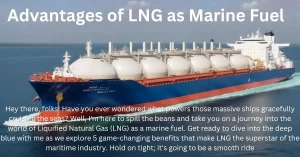Table of Contents
Advantages of LNG as Marine Fuel
Hey there, folks! Have you ever wondered what powers those massive ships gracefully cruising the seas? Well, I’m here to spill the beans and take you on a journey into the world of Liquified Natural Gas (LNG) as a marine fuel. Get ready to dive into the deep blue with me as we explore 5 game-changing benefits that make LNG the superstar of the maritime industry. Hold on tight; it’s going to be a smooth ride.
The Green Elixir: A Cleaner Future at Sea
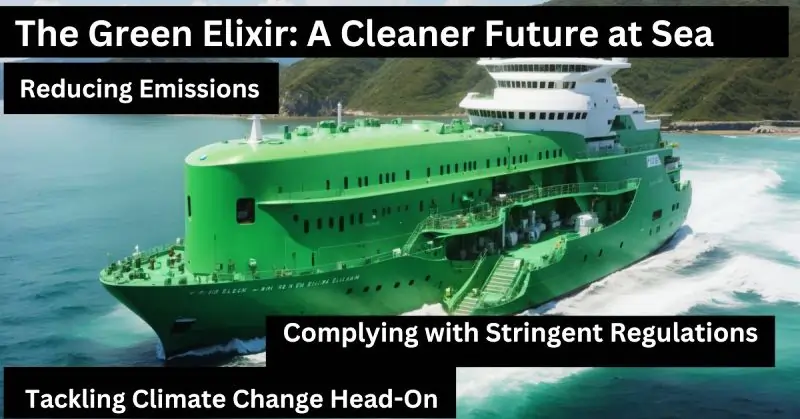


A. Reducing Emissions
Do you know what’s music to our ocean-loving ears? Reduced emissions! LNG is like a breath of fresh air for our planet. When we burn it, it releases way fewer pollutants than traditional marine fuels. 🌬️
For example, sulfur dioxide emissions? LNG slashes them by almost 100%. Nitrogen oxides? Cut by around 90%. Imagine taking your favorite route without leaving a smoky trail behind. Cleaner engines, cleaner skies!
B. Complying with Stringent Regulations
Let’s face it: the maritime world has some strict emissions rules. LNG? It’s our golden ticket to compliance.
For instance, the International Maritime Organization (IMO) has imposed sulfur limits in Emission Control Areas. LNG meets these limits effortlessly, making it a dream come true for shipowners who want to avoid hefty fines and stay on the right side of the law.
C. Tackling Climate Change Head-On
Climate change is no joke, and we’re all in this together. LNG plays its part by emitting significantly fewer greenhouse gases. It’s like choosing a salad over a burger for our planet.
Take carbon dioxide, for example. LNG cuts CO2 emissions by roughly 20% compared to conventional marine fuels. So, by choosing LNG, we’re not just powering ships – we’re powering change, one voyage at a time. 🌍💚
Cost Savings Ahoy!
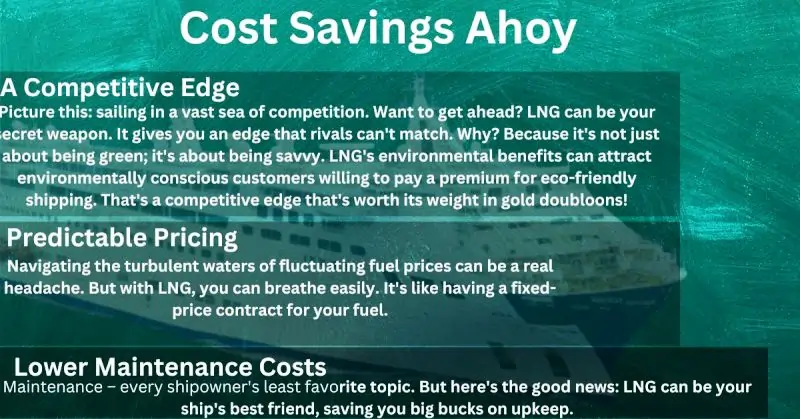


A. A Competitive Edge
Picture this: sailing in a vast sea of competition. Want to get ahead? LNG can be your secret weapon. It gives you an edge that rivals can’t match. Why? Because it’s not just about being green; it’s about being savvy. LNG’s environmental benefits can attract environmentally conscious customers willing to pay a premium for eco-friendly shipping. That’s a competitive edge that’s worth its weight in gold doubloons! 🌊💰
B. Predictable Pricing
Navigating the turbulent waters of fluctuating fuel prices can be a real headache. But with LNG, you can breathe easily. It’s like having a fixed-price contract for your fuel.
For instance, natural gas prices are more stable than oil prices. This means you can forecast your operating costs more accurately, making budgeting a breeze. No more surprises when you refuel!
C. Lower Maintenance Costs
Maintenance – every shipowner’s least favorite topic. But here’s the good news: LNG can be your ship’s best friend, saving you big bucks on upkeep.
Why? Because LNG burns cleaner and leaves fewer deposits in your engine. That means less wear and tear, fewer breakdowns, and longer engine life. It’s like having a personal mechanic on board but without the hefty bills!
Powering Up with Efficiency
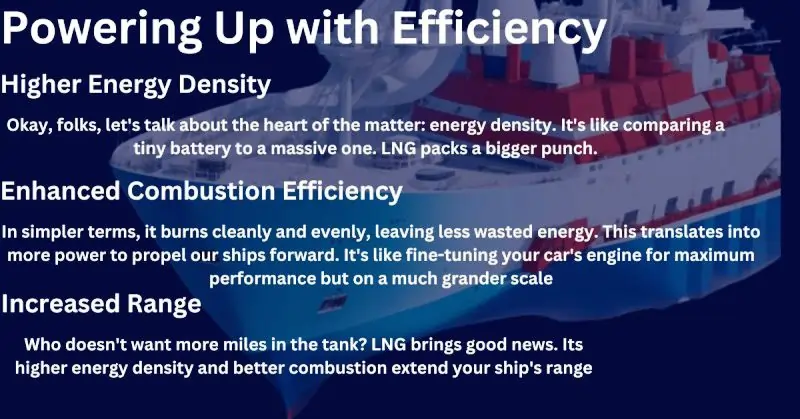


A. Higher Energy Density
Okay, folks, let’s talk about the heart of the matter: energy density. It’s like comparing a tiny battery to a massive one. LNG packs a bigger punch.
For example, a liter of LNG contains more energy than a liter of diesel. This means you can carry less fuel but go a longer distance. Think of it as having a smaller gas tank with much bigger mileage!
B. Enhanced Combustion Efficiency
Now, we’re getting into how LNG makes our engines sing. Picture this: a perfect dance of molecules. LNG’s composition makes combustion smoother.
In simpler terms, it burns cleanly and evenly, leaving less wasted energy. This translates into more power to propel our ships forward. It’s like fine-tuning your car’s engine for maximum performance but on a much grander scale.
C. Increased Range
Who doesn’t want more miles in the tank? LNG brings good news. Its higher energy density and better combustion extend your ship’s range.
Imagine your ship sailing effortlessly for longer distances without refueling stops. It’s like having an extended adventure without constantly checking the fuel gauge. LNG keeps the journey going! ⛴️🌟
Next, we’re all about safety and reliability. Stay tuned! ⚓🔐
Safety First: The Reliability of LNG
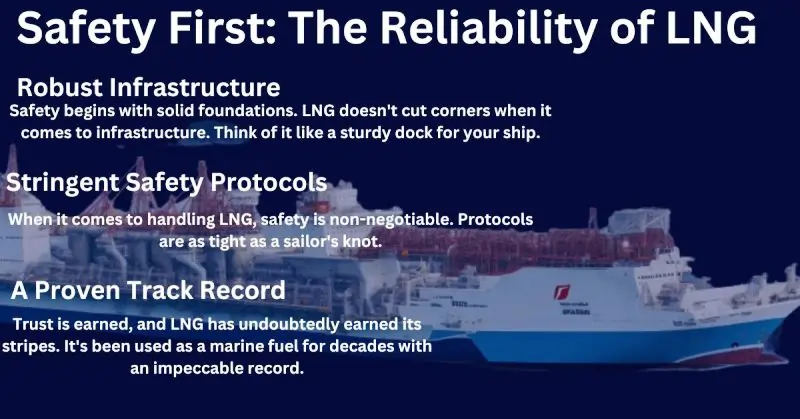


A. Robust Infrastructure
Safety begins with solid foundations. LNG doesn’t cut corners when it comes to infrastructure. Think of it like a sturdy dock for your ship.
For instance, LNG terminals have specialized storage tanks to withstand extreme conditions. They’re built like fortresses, ensuring your fuel stays safe and sound. No worries about leaks or mishaps!
B. Stringent Safety Protocols
When it comes to handling LNG, safety is non-negotiable. Protocols are as tight as a sailor’s knot.
For instance, strict safety checks and procedures are followed before LNG transfer. It’s like a pre-flight checklist for pilots, ensuring everything is in top-notch condition. Safety always comes first.
C. A Proven Track Record
Trust is earned, and LNG has undoubtedly earned its stripes. It’s been used as a marine fuel for decades with an impeccable record.
For example, LNG-powered vessels have sailed countless miles without significant safety incidents. It’s like a seasoned captain at the helm, guiding your ship through calm seas. The reliability of LNG is a proven fact, not just a promise.
Now, let’s set sail into the world of infrastructure and investment. Anchors aweigh!
A Smooth Transition: LNG Infrastructure
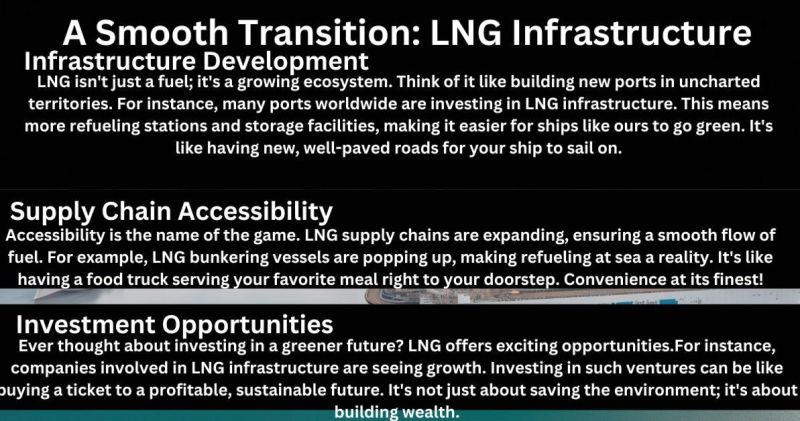


A. Infrastructure Development
LNG isn’t just a fuel; it’s a growing ecosystem. Think of it like building new ports in uncharted territories.
For instance, many ports worldwide are investing in LNG infrastructure. This means more refueling stations and storage facilities, making it easier for ships like ours to go green. It’s like having new, well-paved roads for your ship to sail on.
B. Supply Chain Accessibility
Accessibility is the name of the game. LNG supply chains are expanding, ensuring a smooth flow of fuel.
For example, LNG bunkering vessels are popping up, making refueling at sea a reality. It’s like having a food truck serving your favorite meal right to your doorstep. Convenience at its finest!
C. Investment Opportunities
Ever thought about investing in a greener future? LNG offers exciting opportunities.
For instance, companies involved in LNG infrastructure are seeing growth. Investing in such ventures can be like buying a ticket to a profitable, sustainable future. It’s not just about saving the environment; it’s about building wealth.
As we wrap up this journey through the advantages of LNG as a marine fuel, remember it’s not just about the here and now. It’s about charting a course toward a cleaner, more efficient, and economically sound future for the maritime industry. So, are you ready to make the switch? The future is bright, my friends!
Current Status and Future Prospects of LNG Fuel for Ships
Let’s take a moment to peek at where LNG stands today and what the future holds:
Current Status:
Currently, LNG is making waves (pun intended!) as a marine fuel. More and more ships are using LNG, and more places exist to get it. Big ports are making spots for LNG, like having more gas stations for ships. It’s kind of like how everyone started using smartphones everywhere!
Future Prospects:
The horizon looks promising. With stringent environmental regulations rising, LNG is poised to grow even more. Many shipbuilders are designing vessels that run exclusively on LNG. It’s like having a sneak peek into the ships of tomorrow, where green and efficient are the norm.
Challenges of Using LNG as Marine Fuel
- Infrastructure Hurdles: Developing LNG infrastructure takes time and investment. It’s like building highways before we can cruise at top speed.
- Fuel Availability: In some regions, LNG availability can be limited. Imagine having an electric car but no charging stations nearby.
- Initial Costs: Transitioning to LNG may require an initial investment. It’s like buying a new, fuel-efficient car; it pays off in the long run, but there’s an upfront cost.
- Energy Density: LNG has lower energy per volume than traditional fuels, meaning you need more storage space. It’s like having to carry extra suitcases on your trip.
While challenges are to overcome, the prospects of using LNG as marine fuel offer exciting opportunities for a greener and more prosperous maritime industry. ⚓🌍
The Pros and Cons of LNG as a Maritime Fuel
Let’s weigh the anchor and consider the pros and cons of using LNG as our trusty maritime fuel. Think of it as a sailor’s checklist before setting sail:
| Pros | Cons |
|---|---|
| 1. Lower Emissions | 1. Infrastructure Development |
| 2. Cost Savings | 2. Fuel Availability |
| 3. Improved Efficiency | 3. Initial Investment |
| 4. Enhanced Safety | 4. Storage Challenges |
| 5. Environmental Compliance | 5. Energy Density |
Implementation of LNG as Marine Fuel in Current Vessels
Now, let’s roll up our sleeves and explore how existing vessels can switch to LNG. It’s not just for brand-new ships; we can all join the green fleet!
Retrofitting Engines:
For ships already sailing the seven seas, retrofitting is the name of the game. It’s like giving your old car a new engine. Skilled engineers can adapt your existing machines to run on LNG, making the transition smoother than a calm sea.
Dual-Fuel Systems:
Think of this as a backup plan. Dual-fuel systems allow ships to switch between traditional fuels and LNG. It’s like having a hybrid car that can run on gasoline and electricity. This flexibility helps shipowners transition without significant disruptions.
LNG Containers:
For vessels that can’t accommodate traditional LNG tanks, containerized LNG is the answer. These containers are like shipping containers but filled with LNG. They’re easy to transport and install, like adding a cargo container to your ship.
Bunkering Options:
Ports are gearing up with LNG bunkering options, so even existing vessels can refuel quickly. It’s like finding gas stations along your regular route; the convenience is unbeatable.
So, whether your ship is a seasoned sailor or a rookie, the door to LNG is wide open. With retrofitting, dual-fuel systems, LNG containers, and easy bunkering, anyone can hop on board the green revolution! 🚢🌱
Maritime LNG Fuel Systems for Small Vessels
Let’s zoom in on how LNG makes waves among smaller vessels. Don’t let the big ships steal all the limelight!
LNG-Powered Engines:
Switching to LNG can be a game-changer for small vessels like ferries, fishing boats, and even pleasure craft. Picture it as swapping out your regular car engine for an eco-friendly one. These engines are designed to run on LNG and are getting more compact and efficient daily. It’s like having a smaller, more efficient motor in your speedboat!
Storage and Handling:
Storing LNG on small vessels is something other than rocket science. Think of it as having a well-insulated thermos for your morning coffee. Small LNG tanks are designed to fit snugly on your boat without taking up too much space. They’re safe and easy to handle, making switching to LNG a breeze.
Bunkering Options:
Smaller vessels can now use LNG bunkering stations popping up in many ports, like filling up your car at a gas station. It’s like having your refueling pit stop right on the water. Quick and convenient!
So, whether you’re a skipper of a quaint fishing boat or a weekend sailor, the benefits of LNG aren’t just for the big ships. Small vessels can ride the green wave, too! 🌊🚤
A Review of Demand Prospects for LNG as a Marine Fuel
Let’s deeply dive into the future demand for LNG as a marine fuel. Think of it as predicting the weather before setting sail!
Growing Global Demand:
The demand for LNG in the maritime sector is sailing sky-high. With stricter emissions regulations coming into play, shipowners are setting their sights on cleaner alternatives like LNG. Everyone is switching to electric cars because they’re eco-friendly and cost-effective.
Expanding Infrastructure:
As more ports invest in LNG bunkering facilities, the demand is set to soar. Imagine more gas stations appearing in your neighborhood, making it super convenient to refuel. More accessibility means more need!
International Regulations:
International regulations, such as the IMO’s sulfur limits, steer the shipping industry towards LNG. It’s like a captain following navigational rules; everyone’s on board to stay compliant.
Market Dynamics:
Market dynamics are shifting as LNG becomes more competitive in terms of pricing. It’s like a store offering the latest gadgets at a discount – everyone wants a piece of the action.
The demand for LNG as a marine fuel is steadily rising, and the forecast looks sunny. So, shipmates, expect to see more LNG-powered vessels sailing the high seas in the years to come! ⚓🌞
Conclusion: Anchoring the Benefits of LNG as Marine Fuel
Well, shipmates, we’ve reached the final stretch of our voyage through the world of LNG as marine fuel. Now, let’s drop anchor and sum up the highlights:
Cleaner Oceans, Clearer Skies: By reducing emissions, complying with regulations, and taking on climate change, LNG is our green ticket to a healthier planet.
Counting Coins and Savings: LNG gives us a competitive edge, predictable pricing, and lower maintenance costs. Imagine finding treasure chests full of gold coins while navigating your ship through the markets.
Power-Packed Efficiency: With higher energy density, enhanced combustion efficiency, and increased range, LNG is like a turbo boost for your engines. It’s the difference between a leisurely sail and breaking speed records.
Safety Sets Sail: LNG boasts robust infrastructure, stringent safety protocols, and a proven track record. It’s like having a trustworthy first mate who always watches your back.
Infrastructure and Investments: LNG’s infrastructure development, supply chain accessibility, and investment opportunities are opening new horizons. It’s like discovering uncharted territories full of riches.
LNG isn’t just your typical fuel; it’s like a guiding star leading us toward a cleaner, more efficient, and prosperous maritime future.
LNG, Hydrogen, or Ammonia: Which Fuel for Ships?
Ahoy, it’s decision time! Let’s weigh the options and see which fuel best suits our ships.
LNG (Liquefied Natural Gas):
LNG is like the trusty sailor who’s been around for a while. It’s proven, cleaner, and more available than others. Think of it as a reliable diesel car with lower emissions.
Hydrogen:
Hydrogen is the new kid on the block, promising zero emissions. But there’s a catch—it needs some special handling and infrastructure. It’s like switching from a regular car to a fancy electric one.
Ammonia:
Ammonia is the wild card. It’s clean and energy-dense but comes with safety challenges. Imagine owning a futuristic spaceship; it’s cool but needs extra precautions.
The Verdict:
LNG is like that versatile, all-weather coat—it fits most situations. Hydrogen and ammonia, while exciting, need more infrastructure and safety measures. So, for now, LNG seems to be our trusty first mate on this voyage to a greener maritime future! 🚢⚖️
FAQ on ” Advantages of LNG as Marine Fuel”
Q: What is LNG?
A: LNG stands for Liquefied Natural Gas, a clean and efficient marine fuel.
Q: How does LNG benefit the environment?
A: LNG reduces emissions, helping to combat air pollution and address climate change.
Q: Is LNG more cost-effective than traditional marine fuels?
A: LNG often offers cost savings through competitive pricing and lower maintenance costs.
Q: Is LNG infrastructure readily available?
A: LNG infrastructure is growing, with more refueling stations and supply chain accessibility.
